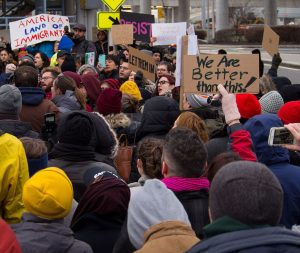Ninth Circuit Rules 3-0 Against Trump Administration: Analysis and Explanation
Tonight, the Ninth Circuit issued an unanimous ruling in State of Washington v. Trump rejecting the Trump Administration’s motion for an emergency stay of the District Court’s temporary injunction. That order by the District Court had the effect of halting enforcement of the President’s January 27 Executive Order suspending entry of aliens from seven specified countries into the United States. In prior posts here and here, I argued that the January 27 Executive Order violated statutory provisions such as the 1980 Refugee Act and also that the Order violated the United States Constitution by discriminating on the basis of religion in the entry of immigrants and non-immigrants.
Tonight’s ruling by the Ninth Circuit is necessarily limited by the procedural posture of the case. The court states at the outset:
To rule on the Government’s motion, we must consider several factors, including whether the Government has shown that it is likely to succeed on the merits of its appeal, the degree of hardship caused by a stay or its denial, and the public interest in granting or denying a stay. We assess those factors in light of the limited evidence put forward by both parties at this very preliminary stage and are mindful that our analysis of the hardships and public interest in this case involves particularly sensitive and weighty concerns on both sides. Nevertheless, we hold that the Government has not shown a likelihood of success on the merits of its appeal, nor has it shown that failure to enter a stay would cause irreparable injury, and we therefore deny its emergency motion for a stay. (opinion at p. 3)
Despite this procedural posture, the opinion issued by the court goes out of its way to make several strong statements of law. First, the court firmly rejects the assertion of the Trump Administration that “the district court lacked authority to enjoin enforcement of the Executive Order because the President has ‘unreviewable authority to suspend the admission of any class of aliens.’ ” (opinion at p. 13).


